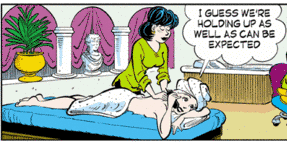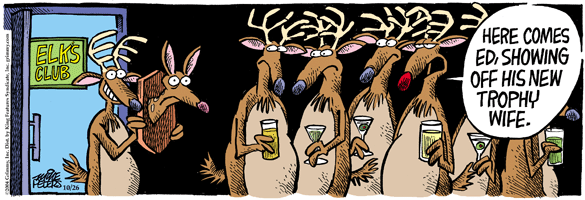Metapost: Comments, including comments about BLONDIE BUMSTEAD NUDE
Post Content
When I moved from my Blogger site to this one, I was rather pleased about the new commenting system. There have been some grumbling from commenters, however, who say that the pop-up comment window is too small, and that they’d like to be able to preview comments before they go live. These are well-reasoned requests, to which I say: bite me. Ha, ha! No, seriously, part of what annoyed me about Blogger was that leaving a comment required you to leave whatever index page you were reading and go to a page that contained just the post you were commenting on — the pop-up window seemed like a good solution to me to make it easier to navigate the site. I’m sure there’s a way to make the pop-up window a bit bigger, and when I have time in the next couple of weeks, I’ll track that down. In the meantime, though, if you are really feeling constricted by the tiny pop-up window, all you have to do is click on the headline of the post instead of the “Comments” link. Doing so will take you to a full-sized page that contains the post and a comment form at the end. Or, if you use a browser like Safari, Firefox, or Mozilla that allows tabbed browsing, you can, as helpful reader Mark Jackson points out, right-click on the comment link at the end of the post and open the comment window in a new tab.
As for previewing posts, that’s not really possible with the software I use to run the blog. However, I could set things up so that you could register and log in as an IRTCSYDHT member. If you log in and leave a comment, you could later go back and edit that comment — logging in would essentially be a mechanism that the blog would use to make sure that you were actually the person who entered the comment originally. Do any of you have any actual interest in this? I’ll set things up if enough people clamor to become registered members of the site; then I’ll probably have to think of some damn fool membership benefits or something like that. Anyway, e-mail me or post a comment if you think this might be fun.
Meanwhile, faithful reader Sue Trowbridge had no problem posting the following comment: “A few weeks ago, didn’t you post that someone had found their way to your site by searching on ‘blondie bumstead nude’? I notice that Sunday’s strip, which actually DID feature a nude Blondie (well, almost…), went unremarked upon by you. So I thought I should say something about it. Because you could definitely see part of her breast. I don’t think I would have noticed that kind of thing in the past, but I think reading people’s comics-related Google queries has sullied me.”
There are in fact many someones who found their way to my site looking for nudie pictures of Blondie Bumstead, and I did of course notice her semi-nude status on Sunday. I passed over it in order to express my outrage at incontinence humor, but Sue is right in that I need to serve my readership. So, for all you perverts out there, here’s what you’re looking for: Blondie, as nude as she’s going to get.

I hope you’re happy. By the way, congratulations, Sue: you’re the first person to publicly admit to being “sullied” by my site.
Speaking of sullied, here’s some strange and alarming search terms for you: “dilbert wedding planning strip,” “baby moses taking bath cartoon,” “oh mary why don’t you have some sense,” “trainwreck drug lingo,” and (no kidding) “how to make crystal meth.” Well, see, first you get a brown paper bag…



